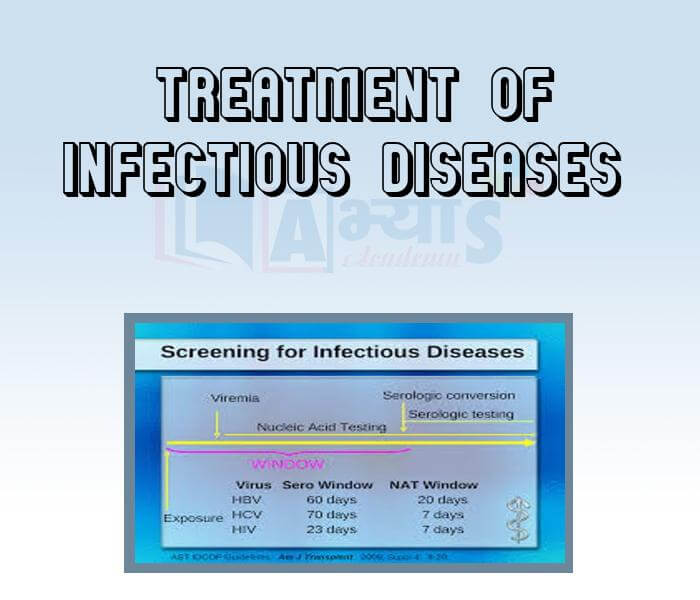Treatment of Infectious Diseases







Treatment of Infectious Diseases
Treatment of Infectious Diseases: We have so far learnt quite a bit about infectious diseases. Now let us see how these diseases can be treated. When we get an infectious disease, our doctor may prescribe different medicines. Some of them reduce the symptoms of the disease, while others kill the disease-causing organisms.
Treatment for Reducing Symptoms: In many diseases, doctors prescribe medicines to reduce symptoms like pain, nausea, etc. This kind of treatment does not cure the disease itself. It is done only for the comfort of the patient. For example, in some diseases, a patient suffering from pain can be given a painkiller. The medicine prescribed as a painkiller will reduce the pain, but it will not cure the disease. Similarly, a cough syrup helps to clear the respiratory tract, but it does not cure the infection that is causing the cough. In some diseases, the only option is to reduce the symptoms. Influenza, for example, does not have a cure. But a doctor may prescribe medicines to reduce the aches and fever that an influenza patient has.
Treatment using Antibiotics:
Antibiotics are usually reserved for bacterial infections, because these type of drugs have no effect on illness caused by viruses.But sometimes it's difficult to tell which type of germ is at work.For example: Pneumonia can be caused by a bacterium,a virus,a fungus or a parasite.
The overuse of antibiotics has resulted in several types of bacteria developing resistance to one or more varities of antibiotics. This makes these bacetria much more difficult to treat.
Antivirals: Drugs has been developed to treat some, but not all viral diseases. Some of the viral diseases that can be treated by antiviral drugs are HIV/AIDS,
Herpes, Hepatitis A, Hepatitis C, Influenza etc.
Antifungals: Topical antifungal medications can be used to treat skin or nail infections caused by fungi. Some fungi infections, such as those affecting the lungs or the mucous membrane, can be treated with an oral antifungal. People with more severe fungal infections, especially in people with weekened immunity, may require intravenous antifungal medication.
Antiparasitics: Some diseases, including malaria are caused by tiny parasites. While there are drugs to treat these diseases, some varieties of parasites have developed immunity against theses drugs.
Which of the following disease is treated to reduce symptoms ? | |||
| Right Option : D | |||
| View Explanation | |||
Gout is a.... | |||
| Right Option : B | |||
| View Explanation |
| |||||||||||||
| Right Option : A | |||||||||||||
| View Explanation | |||||||||||||
Students / Parents Reviews [10]
My experience with Abhyas academy is very good. I did not think that my every subject coming here will be so strong. The main thing is that the online tests had made me learn here more things.

Hiya Gupta
8thMy experience was very good with Abhyas academy. I am studying here from 6th class and I am satisfied by its results in my life. I improved a lot here ahead of school syllabus.

Ayan Ghosh
8thIt has a great methodology. Students here can get analysis to their test quickly.We can learn easily through PPTs and the testing methods are good. We know that where we have to practice

Barkha Arora
10thIt was a good experience with Abhyas Academy. I even faced problems in starting but slowly and steadily overcomed. Especially reasoning classes helped me a lot.

Cheshta
10thAbhyas is a complete education Institute. Here extreme care is taken by teacher with the help of regular exam. Extra classes also conducted by the institute, if the student is weak.

Om Umang
10thOne of the best institutes to develope a child interest in studies.Provides SST and English knowledge also unlike other institutes. Teachers are co operative and friendly online tests andPPT develope practical knowledge also.

Aman Kumar Shrivastava
10thAbhyas Methodology is very good. It is based on according to student and each child manages accordingly to its properly. Methodology has improved the abilities of students to shine them in future.

Manish Kumar
10thIt was good as the experience because as we had come here we had been improved in a such envirnment created here.Extra is taught which is beneficial for future.

Eshan Arora
8thBeing a parent, I saw my daughter improvement in her studies by seeing a good result in all day to day compititive exam TMO, NSO, IEO etc and as well as studies. I have got a fruitful result from my daughter.

Prisha Gupta
8thMy experience with Abhyas is very good. I have learnt many things here like vedic maths and reasoning also. Teachers here first take our doubts and then there are assignments to verify our weak points.
